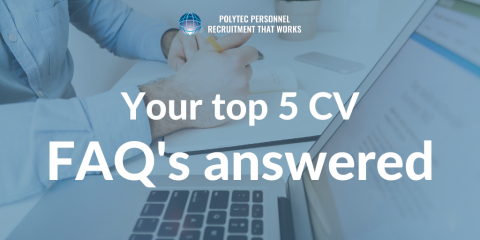Please check the information entered!
- Please check the information entered
A log-in email has been sent to your email address
Forgot password? Reset password
Did you know? CV stands for Curriculum Vitae, which is Latin and translates as “your story”. Your CV is the first chance you get to make a good impression on a potential employer so make sure you spend time and effort getting it right to increase your chances of securing an interview! On average, recruiters will spend no more than 5-10 seconds looking at your CV so aim to be concise and accurate - your CV should not, generally, be longer than two pages.

Personal details: Name, email, contact phone number and address.
Personal statement: One paragraph explaining who you are, what you can offer, and what you’re looking for.
Work experience: Include any relevant work experience listed in date order (recent one first). Include your job title, organisation name, time in that position (month and year that you started and finished each role) and your key responsibilities.
Achievements: List your relevant skills and achievements and back them up with examples. Include how you would apply these to the new role and how it will benefit the organisation
Education: List your educational experience and achievements, the type of qualification and/or the grade you achieved, along with dates.
Hobbies and interests: These aren’t imperative but mentioning relevant extra-curricular interests could back up your skills, help you to stand out from the crowd and give you something to talk about in the interview.
 Your CV is the first thing an employer will see when looking to fill a vacancy. A quick glance will determine if they are prepared to read it in more detail. A messy and confusing CV isn’t likely to impress, even if your qualifications, experience and skills match the job description perfectly
Your CV is the first thing an employer will see when looking to fill a vacancy. A quick glance will determine if they are prepared to read it in more detail. A messy and confusing CV isn’t likely to impress, even if your qualifications, experience and skills match the job description perfectly
 If you have changed jobs more times than you care to mention and are worried it will put your potential employer off, format your CV in a slightly different way.
If you have changed jobs more times than you care to mention and are worried it will put your potential employer off, format your CV in a slightly different way.
Break it up into different headings e.g. ‘Research & Development’, ‘Sales Support,’ ‘Project Management,’ then expand on what you’ve done over the years under each heading.
Remove any short-term jobs (positions held for less than a year) from your career chronology (but keep it on your CV, perhaps as an “other positions” section at the end of your work history) – you don’t want to be caught out when they do any background checks!
 If you have time off due to redundancy, to have a family or to study it’s nothing to be ashamed of or to shy away from! Instead, re-name these periods as “Employment search”, “Family care” or “Study leave”. Just make sure you are honest – it’s best to recognise and justify a gap rather than lie about it…..
If you have time off due to redundancy, to have a family or to study it’s nothing to be ashamed of or to shy away from! Instead, re-name these periods as “Employment search”, “Family care” or “Study leave”. Just make sure you are honest – it’s best to recognise and justify a gap rather than lie about it…..
 Check, check and check again! Incorrect spelling and bad grammar will make you stand out (but for all the wrong reasons). Make sure you use correct spelling and use apostrophes appropriately for words such as their, there, they’re, your, you’re, its and it’s. Use spell check, but always double check yourself as not all grammatical errors will be picked up. Did you know - when we read, we don’t actually read the words we see on the page, we recognise them! We anticipate the next word coming, read the start of it and instantly know how to finish the sentence. Our brains are very clever, but it also means that we often miss our own typos, so get someone else to proof read your CV before you send it out.
Check, check and check again! Incorrect spelling and bad grammar will make you stand out (but for all the wrong reasons). Make sure you use correct spelling and use apostrophes appropriately for words such as their, there, they’re, your, you’re, its and it’s. Use spell check, but always double check yourself as not all grammatical errors will be picked up. Did you know - when we read, we don’t actually read the words we see on the page, we recognise them! We anticipate the next word coming, read the start of it and instantly know how to finish the sentence. Our brains are very clever, but it also means that we often miss our own typos, so get someone else to proof read your CV before you send it out.
Once you have written your CV, it will stay with you for life as you continue to grow, gain experience and expand your skills. Don’t forget to update it as you go along so that the roles and responsibilities are fresh in your mind. Having an up-to-date CV will also enable you to apply for the perfect job at short notice.